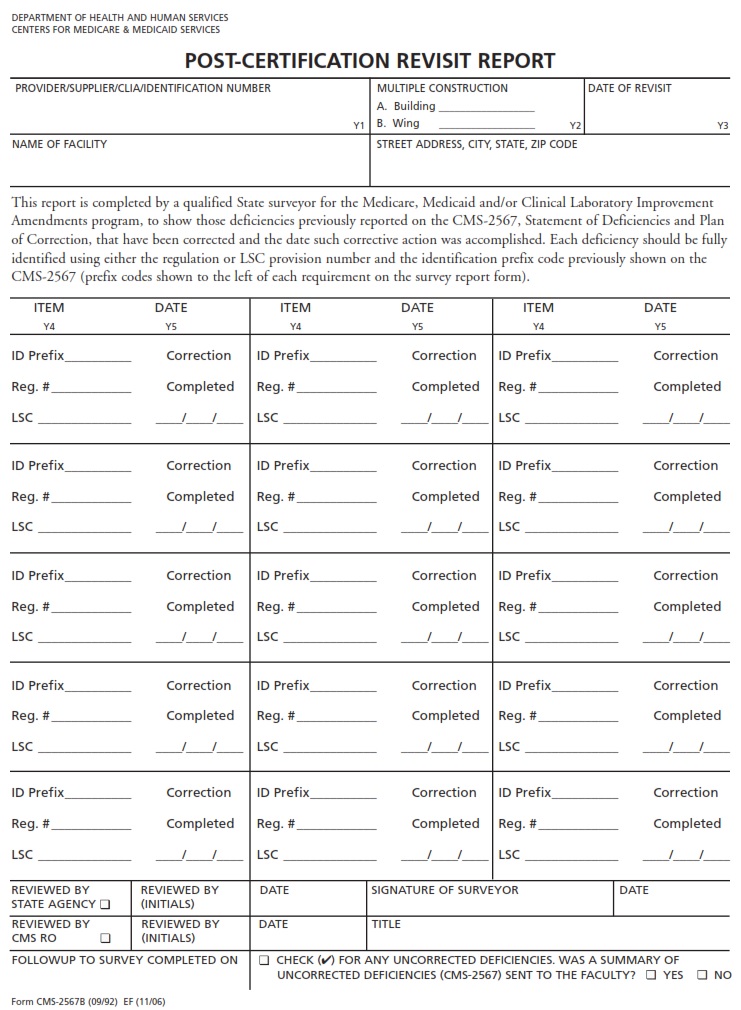CMSFORM.ORG – CMS 2567B – POST-CERTIFICATION REVISIT REPORT – Imagine a scenario where a hospital undergoes a rigorous certification process, checks all the boxes, and breathes a sigh of relief as they pass with flying colors. However, the journey doesn’t end there. Enter the CMS 2567B – Post-Certification Revisit Report, an often overlooked but crucial step in ensuring continued compliance with healthcare regulations. This report serves as a snapshot of the hospital’s ongoing adherence to standards set forth by the Centers for Medicare & Medicaid Services (CMS), shedding light on any potential deficiencies that may have arisen since the initial certification. In this article, we delve into the significance of this revisit report, unraveling its impact on patient care quality and organizational sustainability in today’s ever-evolving healthcare landscape.
Download CMS 2567B – POST-CERTIFICATION REVISIT REPORT
| Form Number | CMS 2567B |
| Form Title | POST-CERTIFICATION REVISIT REPORT |
| Published | 1992-09-01 |
| O.M.B. | – |
| File Size | 118 KB |
CMS 2567B - POST-CERTIFICATION REVISIT REPORT (2823 downloads )
What is a CMS 2567B?
When it comes to finding a CMS 2567B form, one of the best places to start is the official Centers for Medicare & Medicaid Services (CMS) website. This comprehensive online resource offers a wealth of information on various forms and documents related to healthcare compliance. Additionally, healthcare facilities that have undergone certification surveys may also have copies of the CMS 2567B form available upon request.
It’s important to note that the CMS 2567B form can play a crucial role in ensuring compliance with regulatory standards and guidelines set forth by CMS. As such, having access to this document is essential for healthcare facilities looking to maintain their certification status. By proactively seeking out the CMS 2567B form, organizations can stay ahead of compliance requirements and demonstrate their commitment to providing high-quality care for patients.
Where Can I Find a CMS 2567B?
The CMS 2567B, also known as the Post-Certification Revisit Report, is a crucial document within the healthcare industry that plays a significant role in ensuring compliance with CMS regulations. This report serves as a follow-up assessment conducted after a healthcare facility has been certified, aiming to assess whether any deficiencies identified during the initial survey have been addressed effectively. The findings and recommendations outlined in the post-certification revisit report are essential for maintaining high-quality standards of care and ensuring patient safety.
Healthcare organizations must pay close attention to the details presented in the CMS 2567B report, as it provides valuable insights into areas needing improvement and corrective actions required for compliance. By carefully analyzing the recommendations put forth in this document, facilities can enhance their operational processes, standardize best practices, and ultimately deliver better patient outcomes. Additionally, utilizing the information from the post-certification revisit report can help organizations strengthen their overall quality assurance initiatives and demonstrate their commitment to excellence in healthcare delivery.
CMS 2567B – POST-CERTIFICATION REVISIT REPORT
The CMS 2567B, or the Post-Certification Revisit Report, serves as a critical document in the healthcare industry, providing a comprehensive overview of the findings and compliance status following a certification survey. This report plays a crucial role in highlighting any deficiencies identified during the initial survey and tracking the progress of corrective actions taken by healthcare facilities to address these issues. Moreover, it serves as a tool for regulatory agencies to monitor ongoing compliance with quality and safety standards.
One key aspect to note is that the CMS 2567B not only identifies areas for improvement but also recognizes successful efforts made by healthcare organizations to enhance their services and ensure patient safety. By analyzing trends in revisit reports over time, stakeholders can gain valuable insights into systemic issues within the healthcare system and strategic areas for targeted interventions. Ultimately, understanding and leveraging the information contained within these reports can drive continuous quality improvement efforts across various levels of care delivery.
